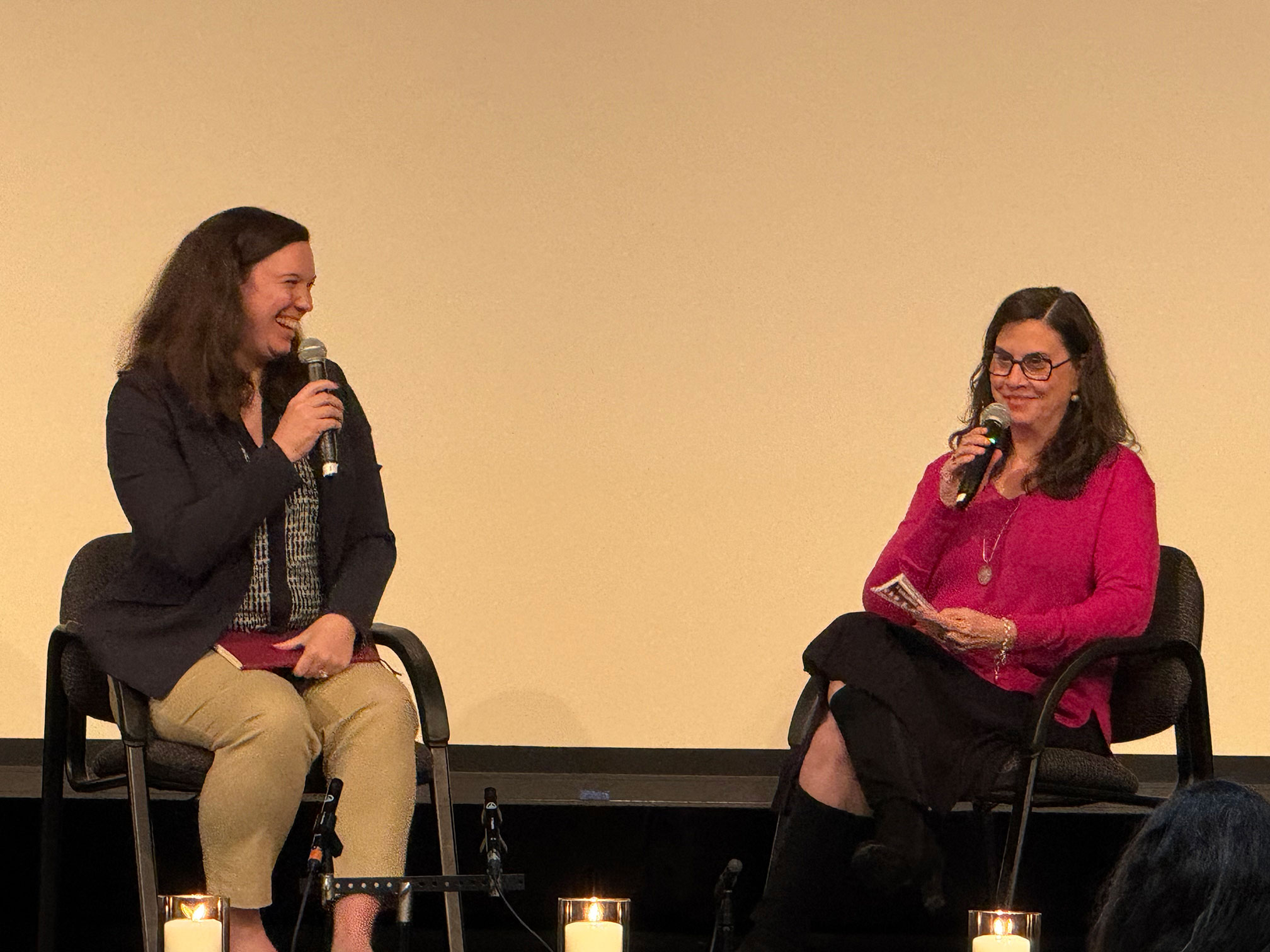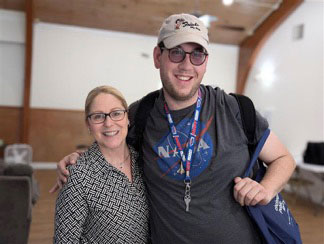Dr. Sarah Crane (left) and Author Alexandra Zapruder (right) speak at the JCC Yom HaShoah commemoration
By Julia Olson
Assistant Editor
A future free of hatred was the focus on this year’s Yom HaShoah Community Commemoration, held at the Mayerson JCC on Sunday, April 27.
“We come together not only to look back in mourning, but also to look forward with purpose,” said Jackie Congedo, CEO of the Nancy & David Wolf Holocaust & Humanity Center. “We remember the resilience, the courage, and the defiance. But remembrance is not just an act of memory, it is an act of resistance — resistance against indifference, against hatred, against silence.”
Rabbi Erin Binder, who delivered the invocation, reiterated the importance of memory, mentioning that the Hebrew word for “remember” occurs 200 times in the Hebrew Bible.
Critical to the message of all the speakers at the event was the notion that memory is not a passive act, but an active process.
Many of the speakers focused on the important role that memory plays in building hope for the future. In his benediction, Rabbi Zachary Goodman spoke of the importance of reading the Mourner’s Kaddish at the event, and emphasized that the ancient text does “not speak of death, but of gratitude.” Goodman continued, stating the memory of those who perished in the Holocaust calls us “to speak for the voiceless, to defend the dignity of every human being, to stand against cruelty wherever its arises. It calls us to be upstanders, to be the bearers of light.” By remembering, stated Goodman, “we commit ourselves anew to building a world of passion, a world of justice and of peace, a world where ‘never again’ is not just a promise, but it is a reality we create together, each and every day.”
A candle lighting ceremony also took place, during which descendants of Holocaust survivors lit candles to commemorate loved ones no longer here. Members of the Holocaust and Humanity Center’s Teen Upstander Colation read aloud the histories of those commemorated by the candle lighting.
The Teen Upstander Coalition is a program for 9th and 10th grade students. It brings together a diverse group of high school students from across Cincinnati and instills leadership values aimed at strengthening the foundations of community.
The commemoration was concluded with a conversation between Dr. Sarah Crane, Professor of Judaic Studies at the University of Cincinnati and Alexandra Zapruder, author of “Salvaged Pages: Young Writers’ Diaries of the Holocaust.” Crane is a visiting professor at UC. Her focus is Holocaust and Genocide Studies. She also serves as the scholar-in-residence at the Holocaust & Humanity Center. Zapruder is a founding member of the United States Holocaust Memorial Museum. Her 2002 book “Salvaged Pages: Young Writers’ Diaries of the Holocaust,” focuses on understanding how adolescents during the atrocities of World War II understood the world and their place in it.
Crane and Zapruder discussed the book and the importance of the youth experience in the creation of history.
Zapruder encouraged the audience to grapple with the difficulties of the Holocaust that these diaries present. Recognizing darkness is part of understanding that history. “We wouldn’t be here if goodness had triumphed. And so let’s look at that, and let’s be honest about it.”
Zapruder focused on the importance of young people’s contribution to the story of the Holocaust. “Here were young people who made a serious historical and literary contribution to our understanding of this history. And that counts. That matters. What they had to say about their lives, what they documented about their lives, changes what we understand about this history. And they did that as young people….They didn’t wait to grow up. They had something to say, something that can teach us right now,” said Zapruder. One of Crane’s final questions to Zapruder focused on the tie between the diaries of Holocaust victims and our contemporary experience today. “Do you see a role for these diaries in particular, in their ability to connect with young people today?,” asked Crane.
Zapruder stated that the diaries “open up ways for young people to grapple with what is perhaps the most difficult dimension of Holocaust education which is moral fragility. People were faced with moral dilemmas. Even victims were faced with moral dilemmas, as we know.” The diaries, said Zapruder, sometimes function as a theological reflection on the role of God, and God’s intention for the Jewish people. “One thing that young people can do is join in the questions, join in the struggle, of the writers, to make sense of what is happening to them. Engage with those questions,” said Zapruder. “The other piece of it is just for young people to realize that young people can make history. I don’t mean ‘make history’ in an after school special kind of way, but to make history in the sense of literally recording their lived experiences as young people,” added Zapruder.





